Paytm Bundle
Who Really Controls Paytm?
Recent regulatory crackdowns have cast a spotlight on Paytm, making investors and stakeholders alike question: Who owns Paytm company? This question is more critical than ever, especially given the significant impact of ownership on a company's strategic direction and resilience. Founded by Vijay Shekhar Sharma, Paytm, officially One97 Communications Limited, has rapidly transformed from a mobile recharge platform into a fintech giant.
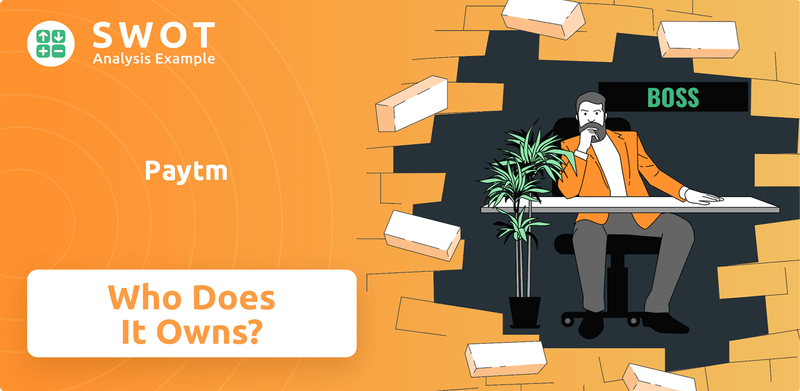
Understanding the Paytm SWOT Analysis is essential, but knowing the Paytm owner and the Paytm company ownership structure is equally vital. This exploration will unveil Paytm's ownership history, from the Paytm founder's initial stake to the current shareholding distribution, including major shareholders and the influence of its IPO. Delving into the question of "Who owns Paytm" reveals critical insights into its governance, its capacity to navigate regulatory challenges, and its long-term strategic direction, providing a comprehensive view for anyone interested in Paytm's current valuation and future prospects.
Who Founded Paytm?
The story of the Paytm owner begins with Vijay Shekhar Sharma, the visionary founder. He played a crucial role in the company's inception and initial ownership structure. While the exact early equity splits aren't fully detailed, Sharma was the sole founder and primary owner at the start.
Sharma's vision for a mobile-first payments platform set the stage for Paytm's evolution. Early financial backing likely came from a mix of personal funds and informal investments from friends and family, which is common for startups in their early stages. This initial phase was critical in shaping the future of the company.
As Paytm grew, it attracted more formal investments. SAIF Partners (now Elevation Capital) was among the earliest and most significant external investors, investing in One97 Communications in 2007. These early venture capital injections were vital in shaping the ownership landscape, often involving preferred shares and board representation. These early agreements included standard startup clauses like vesting schedules for founder shares to ensure commitment and buy-sell agreements to manage liquidity and future ownership changes.
Vijay Shekhar Sharma founded Paytm, which is the primary
SAIF Partners (Elevation Capital) was an early investor. These investments helped shape the company's ownership.
There were no significant early ownership disputes. Sharma's leadership was central to the company's early success.
Control was heavily concentrated with Sharma in the early stages. This reflected his entrepreneurial vision.
Early funding included personal funds and informal angel investments. This support was crucial in the beginning.
Sharma's role was pivotal in the company's genesis. His vision shaped the mobile-first payments platform.
The
- Vijay Shekhar Sharma was the
and driving force. - SAIF Partners (Elevation Capital) was among the early investors.
- Early ownership was stable, centered around Sharma.
- Sharma's vision was key to the company's early success.
Paytm SWOT Analysis
- Complete SWOT Breakdown
- Fully Customizable
- Editable in Excel & Word
- Professional Formatting
- Investor-Ready Format
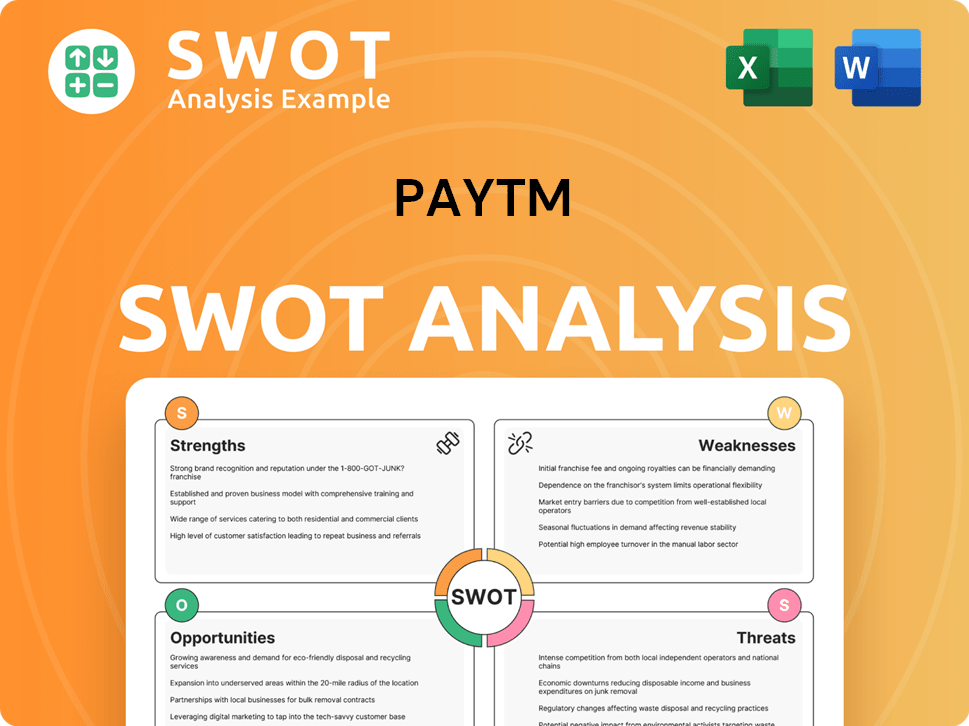
How Has Paytm’s Ownership Changed Over Time?
The ownership of One97 Communications Limited, the parent company of the digital payments platform, has evolved significantly since its inception. Early investments from global entities like Ant Group (an affiliate of Alibaba Group) and SoftBank's Vision Fund were crucial. These investments fueled the company's expansion and diversification of services, setting the stage for its Initial Public Offering (IPO).
The IPO on November 18, 2021, marked a significant milestone, with an initial market capitalization of approximately $18 billion. However, the stock has experienced challenges post-listing, leading to shifts in the shareholding structure. The founder, Vijay Shekhar Sharma, remains a key shareholder, with adjustments to his stake, including acquiring a 10.3% stake in Paytm Payments Bank in March 2024, becoming the largest shareholder in the bank.
| Shareholder | Stake (Early 2024) | Notes |
|---|---|---|
| Vijay Shekhar Sharma | Significant | Largest shareholder in Paytm Payments Bank |
| Antfin (Netherlands) Holding B.V. | Significant | Affiliate of Ant Group, stake adjustments |
| Foreign Portfolio Investors (FPIs) | 19.34% (March 2024) | Decreased stake from 21.03% in December 2023 |
| Domestic Institutional Investors (DIIs) | 6.36% (March 2024) | Increased stake from 6.07% |
| Mutual Funds | 4.99% (March 2024) | Increased stake from 2.79% |
The shifts in ownership directly influence the company's strategy and governance. The increased stake of domestic institutions suggests growing confidence from local investors, while adjustments by foreign investors reflect a dynamic re-evaluation of their positions. For more details, you can explore the historical journey of the company's ownership in this article about the company's evolution.
The ownership structure of the company is a dynamic landscape, shaped by investments, the IPO, and subsequent market performance.
- Vijay Shekhar Sharma is a pivotal figure, maintaining a significant stake.
- Institutional investors, both domestic and foreign, play a crucial role.
- Ant Group's affiliate, Antfin, remains a major shareholder, with adjustments over time.
- These changes impact strategic decisions and the company's future direction.
Paytm PESTLE Analysis
- Covers All 6 PESTLE Categories
- No Research Needed – Save Hours of Work
- Built by Experts, Trusted by Consultants
- Instant Download, Ready to Use
- 100% Editable, Fully Customizable
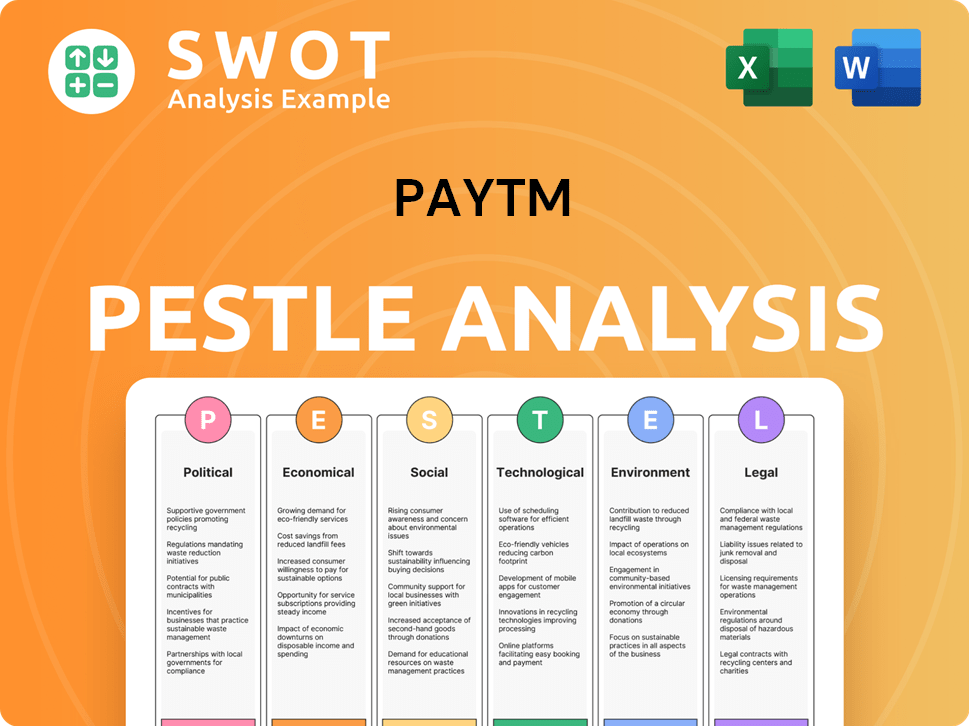
Who Sits on Paytm’s Board?
The Board of Directors of One97 Communications Limited, the Paytm parent company, oversees its strategic direction and governance. As of early 2024, the board includes Vijay Shekhar Sharma as Managing Director and CEO, maintaining his significant influence. The board also includes representatives from major institutional investors and independent directors, ensuring objective oversight and good corporate governance. The composition of the board can change based on shareholder stakes and governance agreements.
The board's structure has evolved, especially with regulatory scrutiny and strategic realignments. For instance, the reconstitution of the board of Paytm Payments Bank with five independent directors, without any nominees from One97 Communications, demonstrates an effort to address governance concerns and regain regulatory trust. This restructuring followed actions by the Reserve Bank of India against Paytm Payments Bank in early 2024, which heightened scrutiny on leadership accountability and internal controls.
| Board Member | Position | Notes |
|---|---|---|
| Vijay Shekhar Sharma | Managing Director & CEO | Founder and key decision-maker |
| Institutional Investor Representatives | Various | Nominees from major shareholders |
| Independent Directors | Various | Provide objective oversight |
The voting structure generally follows a one-share-one-vote principle for publicly traded equity. However, the influence of major shareholders like Vijay Shekhar Sharma, who increased his direct beneficial ownership, is significant. Regulatory actions by the RBI against Paytm Payments Bank in early 2024 have influenced board decisions and strategic direction. The company's response, including board restructuring, reflects efforts to address governance issues and regain regulatory trust. The Paytm owner, Vijay Shekhar Sharma, remains a central figure in the company's control.
The board includes Vijay Shekhar Sharma, institutional investor representatives, and independent directors.
- Vijay Shekhar Sharma is the Managing Director and CEO, maintaining significant influence.
- The voting structure is primarily one-share-one-vote, but major shareholders have considerable impact.
- Regulatory actions have led to board restructuring to improve governance and regain trust.
- The Paytm company ownership structure reflects a mix of founder control and institutional investment.
Paytm Business Model Canvas
- Complete 9-Block Business Model Canvas
- Effortlessly Communicate Your Business Strategy
- Investor-Ready BMC Format
- 100% Editable and Customizable
- Clear and Structured Layout
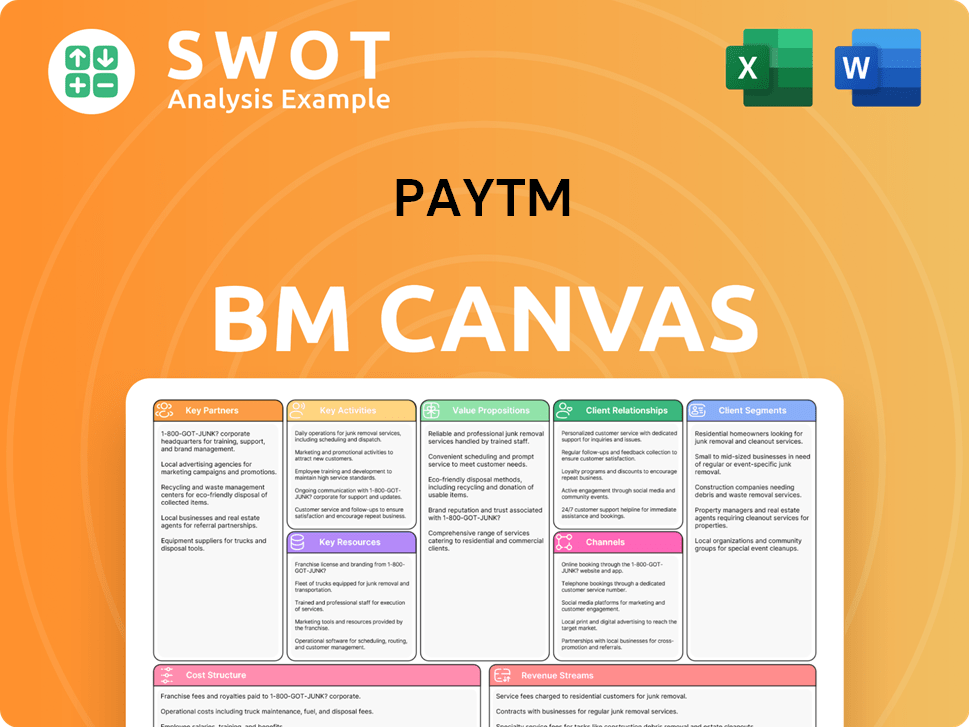
What Recent Changes Have Shaped Paytm’s Ownership Landscape?
Over the past few years, the ownership structure of the company has seen significant shifts, particularly influenced by its initial public offering (IPO) and regulatory changes. A key development in 2023 was the sale of a 10.3% stake by Antfin to Vijay Shekhar Sharma, which increased Sharma's direct ownership to 19.42%, making him the largest shareholder. This move was seen as a strategic realignment, potentially to address concerns about foreign ownership.
The regulatory environment has played a crucial role in shaping the company's ownership. The Reserve Bank of India's actions against Paytm Payments Bank led to operational restrictions, impacting the company's stock performance and bringing its ownership under scrutiny. As of March 2024, Antfin's stake in Paytm Payments Bank was reduced to zero, with Sharma acquiring the remaining 10.3% stake from One97 Communications Limited, further consolidating his control over the banking arm. This shift reflects the dynamic nature of the fintech sector and the impact of regulatory pressures on Paytm's growth strategy.
Industry trends show increasing scrutiny of foreign ownership in the Indian fintech sector, leading to divestments and restructuring. There is also a rise in domestic institutional investor stakes, while foreign portfolio investor holdings have seen some moderation. The reconstitution of the board of Paytm Payments Bank with independent directors and the absence of One97 Communications nominees highlight efforts to reinforce governance and regain regulatory trust. These changes underscore how regulatory environments and strategic realignments by major shareholders can significantly alter a company's ownership landscape.
| Ownership Aspect | Details | Recent Developments |
|---|---|---|
| Paytm Owner | Vijay Shekhar Sharma | Increased direct beneficial ownership to 19.42%. |
| Paytm Shareholding | Antfin | Reduced stake in Paytm Payments Bank to zero as of March 2024. |
| Regulatory Impact | RBI Actions | Led to operational restrictions and board reconstitution. |
Vijay Shekhar Sharma is the founder and has increased his stake in the company, becoming the largest shareholder. His strategic moves have reshaped the ownership dynamics.
The parent company, One97 Communications Limited, has seen significant changes in its ownership structure. The regulatory environment has influenced these shifts.
Major shareholders include Vijay Shekhar Sharma and institutional investors. The shareholding has evolved due to strategic decisions and regulatory impacts.
Vijay Shekhar Sharma is the primary owner, with significant influence. Institutional investors also hold substantial shares in the company.
Paytm Porter's Five Forces Analysis
- Covers All 5 Competitive Forces in Detail
- Structured for Consultants, Students, and Founders
- 100% Editable in Microsoft Word & Excel
- Instant Digital Download – Use Immediately
- Compatible with Mac & PC – Fully Unlocked
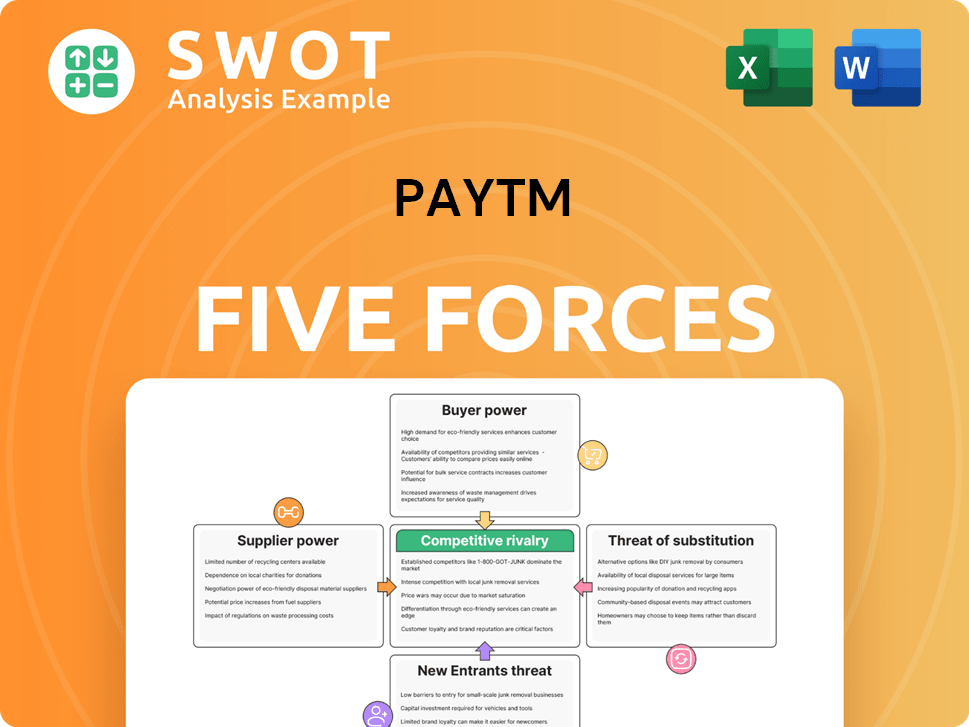
Related Blogs
- What are Mission Vision & Core Values of Paytm Company?
- What is Competitive Landscape of Paytm Company?
- What is Growth Strategy and Future Prospects of Paytm Company?
- How Does Paytm Company Work?
- What is Sales and Marketing Strategy of Paytm Company?
- What is Brief History of Paytm Company?
- What is Customer Demographics and Target Market of Paytm Company?
Disclaimer
All information, articles, and product details provided on this website are for general informational and educational purposes only. We do not claim any ownership over, nor do we intend to infringe upon, any trademarks, copyrights, logos, brand names, or other intellectual property mentioned or depicted on this site. Such intellectual property remains the property of its respective owners, and any references here are made solely for identification or informational purposes, without implying any affiliation, endorsement, or partnership.
We make no representations or warranties, express or implied, regarding the accuracy, completeness, or suitability of any content or products presented. Nothing on this website should be construed as legal, tax, investment, financial, medical, or other professional advice. In addition, no part of this site—including articles or product references—constitutes a solicitation, recommendation, endorsement, advertisement, or offer to buy or sell any securities, franchises, or other financial instruments, particularly in jurisdictions where such activity would be unlawful.
All content is of a general nature and may not address the specific circumstances of any individual or entity. It is not a substitute for professional advice or services. Any actions you take based on the information provided here are strictly at your own risk. You accept full responsibility for any decisions or outcomes arising from your use of this website and agree to release us from any liability in connection with your use of, or reliance upon, the content or products found herein.